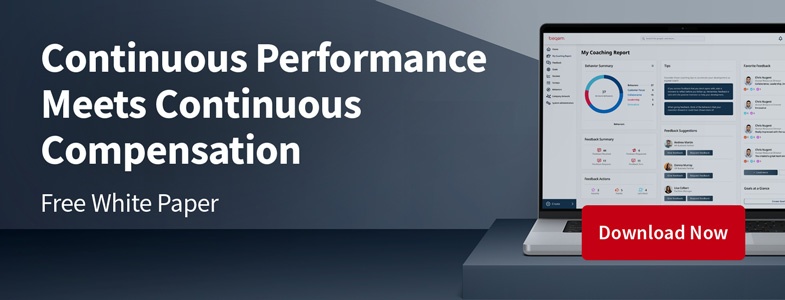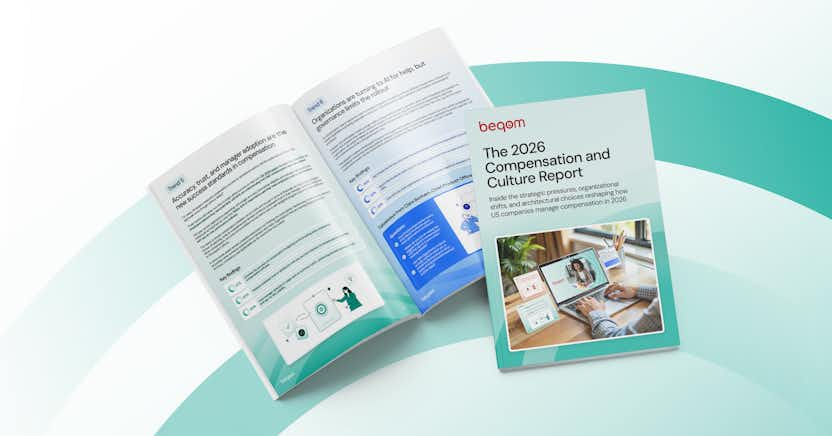5 Key Workplace Trends to Watch

Learn more about the following beqom products
The pandemic was a trend accelerator, but the existing trends in performance and rewards were already in need of new approaches and solutions.
Here are 5 workplace trends we expect to continue and increase in 2023, and what it will take to meet the challenges they present.
1) Performance and productivity set to come into sharper focus
With inflation, economic turmoil and uncertainty on the horizon in 2023, a sharper focus will be placed on improving employee performance and productivity to boost output and bottom lines. Over the past few years, the focus, understandably, has been on prioritizing connection, relationships, and wellbeing. Many will admit that performance management was deprioritized over the course of the pandemic.
However, pending economic uncertainty will likely see performance move higher up on the HR agenda. Organizations restructuring to overcome the challenges they face as a business are going to need a clear understanding of who their high performers are and ensure they are evaluating people fairly, based on accurate data linked to true contribution.
2) Gender bias 2.0—the rise of proximity bias
Whilst hybrid working practices are now officially mainstream and offer workers greater flexibility, these have given rise to an unintended consequence—proximity bias. According to a report by the Society for Human Resource Management (SHRM), two-thirds (67%) of supervisors overseeing remote workers admitted to believing remote workers are more replaceable than onsite workers. Forty-two percent said they sometimes forget about remote workers when assigning tasks. This may explain why remote workers get promoted less often than their peers, despite being 15% more productive on average.
Now consider that studies have found that women are more likely than men to work remotely, as they shoulder more childcare duties, a trend which only increased during the COVID-19 pandemic. Proximity bias therefore contributes to gender bias. Proactive management of this emerging bias will be key before it becomes a new obstacle for diversity and inclusion practices. Careful performance management can help to overcome such bias by setting clear, measurable goals and scheduling frequent check-ins to ensure open dialogue with workers.
3) Data and employee metrics will shape tough business decisions
With some businesses facing tough realities linked to restructuring and reshaping their organizations in the months to come, understanding employee performance using objective evidence and data will grow in importance. The potential bias that results from subjective performance evaluations of employees by managers opens employers up to too much risk, both legal and in terms of talent optimization.
When relevant, evidence-led feedback is brought into the fold, the performance management experience becomes a fair reflection of an individual's true contribution.
4) Rewards must be reinvented
With rising inflation and a job market where top talent is in high demand, the traditional approach to compensation will no longer suffice. In the last two years, we have witnessed the Great Resignation, hybrid working, Gen Z joining the workforce, inflation, and other political conditions in the world, which have changed the expectations of employees, who desire ‘something more’ from their work.
Compensation and rewards offer an opportunity for employers to set themselves apart. With some fresh, creative thinking about how rewards can enhance working life in a more agile way, employers can ensure employees' needs and wants are met, reduce the impact of inflation, and help to motivate and inspire workers. That in turn can help businesses to deliver on performance goals and retain workers.
5) Quiet quitting is here to stay
Despite economic uncertainty, the trend of quiet quitting hasn’t yet gone away. In fact, it may become even more prevalent, with employees taking on the burden of other workers in the wake of a tough economic climate.
Checking in frequently with individuals and ensuring workers are ‘bought into’ your organization’s mission will be important. Giving purpose through meaningful goals and conversations, along with recognizing people when they deliver through positive reinforcement, will all be key ingredients for an effective performance management strategy.
Adapting to new performance and rewards needs
Economic conditions are going to continue to push companies towards more efficient HR processes, equity in the treatment and pay of employees, and increased engagement of talent. HR departments will continue to seek solutions to root out bias in pay, performance reviews, and promotions.
Overall, the trend in performance management is likely to be towards more personalized, development-focused approaches—based on understanding the employee experience that support employees in reaching their full potential, even as rewards programs aim to cater to individual needs and support employees in having balanced lives and fulfillment at work.
Companies would be well advised to have systems and processes in place that can drive new approaches to performance and rewards.
For guidance on technology solutions to prepare for the workplace trends of today and tomorrow, talk to a performance and compensation specialist at beqom.








